

University of Oregon Study Abroad. International Affairs. Identifying scholarships for studying abroad can take time and effort, but most scholarship recipients will tell you it is worth the time.
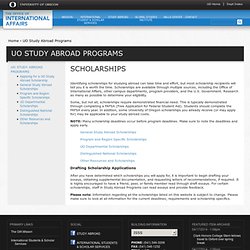
Scholarships are available through multiple sources, including the Office of International Affairs, other campus departments, program providers, and the U.S. Government. Research as many as possible to determine your eligibility. Some, but not all, scholarships require demonstrated financial need. This is typically demonstrated through completing a FAFSA (Free Application for Federal Student Aid). NOTE: Many scholarship deadlines occur before program deadlines. General Study Abroad Scholarships Program and Region Specific Scholarships UO Departmental Scholarships Distinguished National Scholarships Other Resources and Scholarships Drafting Scholarship Applications Please note: Information regarding all the scholarships listed on this website is subject to change. Course Requirements/GPA Required. As you survey the more than 190 study abroad programs and 150 global internships available to UO students, you may find yourself overwhelmed by the sheer variety on offer.
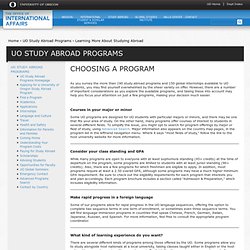
However, there are a number of important considerations as you explore the available programs, and taking these into account may help you focus your attention on just a few programs, making your decision much easier. Courses in your major or minor Some UO programs are designed for UO students with particular majors or minors, and there may be one that fits your area of study.
On the other hand, many programs offer courses of interest to students in several different fields. To simplify the issue, you might opt to search for program offerings by major or field of study, using Advanced Search. International Affairs. Can I Study Abroad in English?
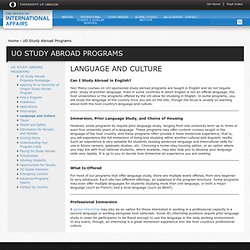
Yes! Many courses on UO-sponsored study abroad programs are taught in English and do not require prior study of another language. Even in some countries in which English is not an official language, the host universities or the programs offered by the UO allow for studying in English. In some programs, you will study the language of the country once you are on the site, though the focus is usually on learning about both the host country’s language and culture. International Affairs. Travel/Campus. Self-Arranged Travel In most cases, students in UO-sponsored study and internship programs will arrange travel for themselves.
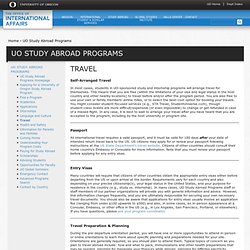
This means that you are free (within the limitations of your visa and legal status in the host country and other nearby locations) to travel before and/or after the program period. You are also free to use your own or family members' airline miles, or to select the best-cost option for booking your travels. You might consider student-focused services (e.g., STA Travel, StudentUniverse.com), though student-class tickets are more difficult/expensive (or even impossible) to change or get refunded in case of a missed flight.
In any case, it is best to wait to arrange your travel after you have heard that you are accepted to the program, including by the host university or program site. Passport All international travel requires a valid passport, and it must be valid for 180 days after your date of intended return travel back to the US. Entry Visas. Costs. The cost of a study abroad program depends on many factors and it is important to keep these in mind as you are researching, selecting and budgeting for your time abroad.
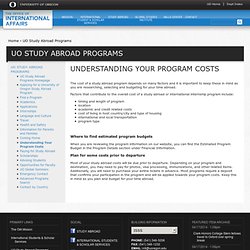
Factors that contribute to the overall cost of a study abroad or international internship program include: timing and length of programlocationacademic and credit related costscost of living in host country/city and type of housinginternational and local transportationprogram type Where to find estimated program budgets When you are reviewing the program information on our website, you can find the Estimated Program Budget in the Program Details section under Financial Information. Location. Pacific University. Minimum GPA Required. Entrance Test Requirements for Entering Freshmen. Course Requirements for Entering Freshmen. Curriculum. The MSVS curriculum is structured to fit each individual's background in vision science and interest in specific fields.
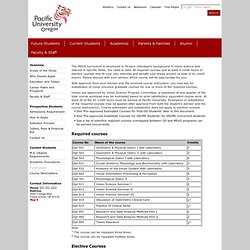
You need to take 38 required courses and at least 4 credit hours of elective courses that fit your own interests and benefit your thesis project (a total of 41 credit hours). Please discuss with your advisor which course will be appropriate for you. With approval from your advisor and the involved course instructors, you may ask for substitution of yuour previous graduate courses for one or more of the required courses. Unless pre-approved by Vision Science Program Committee, a maximum of one quarter of the total course workload may be exempted based on prior satisfactory equivalent course work. At least 30 of the 41 credit hours must be earned at Pacific University. See 'Pre-approved Exempted Courses for Post-OD Students' later in this document.
Required courses Note: 1 The course can be repeated three times. 2 The course can be repeated multiple times. Costs. Pacific Campus Locations. Location. Portland State University. Minimum GPA Required. Entrance Test Requirements for Entering Freshmen. Course Requirements for Entering Freshmen. Students studying for a business degree at Portland State are considered pre-business students until they are formally admitted to the School of Business , generally at the end of their sophomore year or beginning of their junior year.
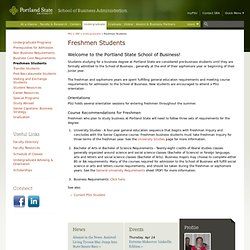
The freshman and sophomore years are spent fulfilling general education requirements and meeting course requirements for admission to the School of Business. New students are encouraged to attend a PSU orientation. Orientations PSU holds several orientation sessions for entering freshmen throughout the summer. Nature of Program & Curriculum. Campus Location. Costs. Campus. Portland Community College. Entrance Test Requirements for Entering Freshmen. Course Requirements for Transfering Students. Nature of Program & Curriculum. What’s New at the Curriculum Office?
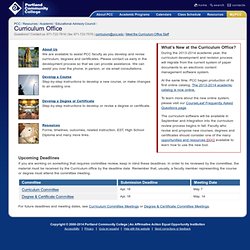
During the 2013-2014 academic year, the curriculum development and revision process will migrate from the current system of paper documents to an electronic content management software system. At the same time, PCC began production of its first online catalog. The 2013-2014 academic catalog is now online. To learn more about the new online system, please visit our CourseLeaf Frequently Asked Questions page. The curriculum software will be available in September and integration into the curriculum review process begins in fall. About Us We are available to assist PCC faculty as you develop and revise curriculum, degrees and certificates. Develop a Course Step-by-step instructions to develop a new course, or make changes to an existing one. Develop a Degree or Certificate Step-by-step instructions to develop or revise a degree or certificate.
Resources Forms, timelines, outcomes, related instruction, EST, High School Diploma and many more links. Minimum GPA Required. Costs. Location. Campus Locations. Course Requirements.